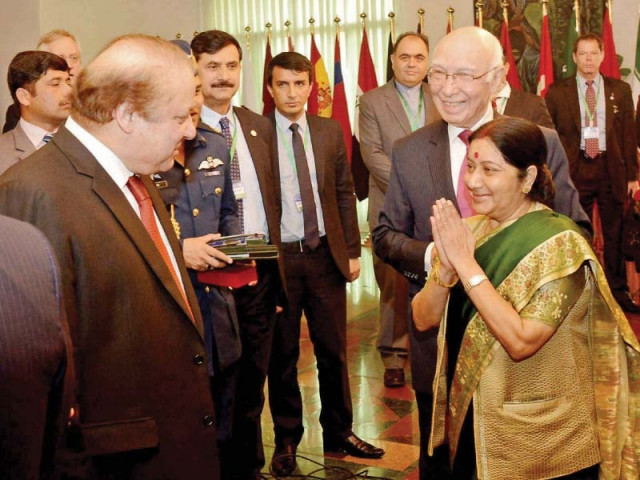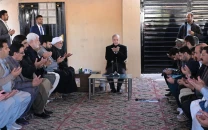Breakthrough at last
Pakistan, India agree to resume stalled talks on all issues including Kashmir

Indian Foreign Minister Sushma Swaraj greets Prime Minister Nawaz Sharif in Islamabad. PHOTO: NNI
Ten days and three meetings — that’s all it took Pakistan and India to break a years-old deadlock in their strained relations.
A ‘chance meeting’ between their prime ministers in Paris and surprise talks between their national security advisers in Bangkok led to a formal meeting between their top foreign policy officials in Islamabad on Wednesday which produced a major agreement: resumption of a stalled dialogue process.
India, Pakistan agree to resume comprehensive dialogue
“I understand you all have been waiting for some big news, so we have big news for you…. Pakistan and India have decided to resume the composite dialogue,” India’s External Affairs Minister Sushma Swaraj told reporters after her two-hour-long talks with Prime Minister’s Adviser on Foreign Affairs Sartaj Aziz.
The top Indian diplomat, who also met Prime Minister Nawaz Sharif, said the process would have a new name: comprehensive composite dialogue.
According to a joint statement issued by the Foreign Office, the Comprehensive Bilateral Dialogue would cover peace and security, confidence building measures, Jammu and Kashmir, Siachen, Sir Creek, Wullar Barrage/Tulbul Navigation Project, economic and commercial cooperation, counterterrorism, narcotics control and humanitarian issues, people-to-people exchanges and religious tourism.
A spark of optimism
The foreign secretaries of the two countries would now work out the modalities and schedule of meetings under the comprehensive dialogue, said the statement.
The unexpected breakthrough was achieved after Islamabad assured New Delhi of steps to expedite the early conclusion of the trial of Mumbai siege suspects.

Sushma and Aziz condemned terrorism and resolved to cooperate to eliminate the scourge. “They noted the successful talks on terrorism and security-related issues in Bangkok by the two NSAs and decided that the NSAs will continue to address all issues connected to terrorism,” the statement said.
The Indian decision to resume the composite dialogue is a clear departure from its earlier stance that it will not enter into meaningful talks with Pakistan on Kashmir and other issues unless its concerns on terrorism are addressed.
Afghans, Pakistan hold firm on ties; India ‘extends hand’ to Pakistan
India had suspended the composite dialogue soon after the November 2008 Mumbai attacks, which were blamed on the Laskhar-e-Taiba militant group.
The term composite dialogue was first coined in 1997 when then Indian prime minister Indar Kumar Gujral and his Pakistani counterpart Nawaz Sharif had agreed to more structured talks between their countries.
Talks were disrupted a few months later when the two countries conducted nuclear tests. The process resumed in 1998 during the famous Lahore Declaration when then Indian prime minister Atal Behari Vajpayee travelled to Pakistan. However, a year later the Kargil conflict again disrupted the process. The dialogue restarted in January 2004 and continued till November 2008.
After a hiatus of two and a half years, the process was back on track in 2011. However, talks were halted again in 2012 due to tensions along the Line of Control and working boundary. In May 2014, Premier Modi invited his Pakistani counterpart to his swearing-in ceremony and both agreed to arrange a meeting of foreign secretaries to explore options for future engagements.
However, talks scheduled in Islamabad in August 2014 were called off by New Delhi after it objected to Pakistani High Commissioner Abdul Basit’s meeting with Kashmiri leaders ahead of the scheduled meeting.
Indian foreign minister Sushma Swaraj arrives in Islamabad
In July this year, Modi and Nawaz met at the sidelines of Shangai Cooperation Organisation (SCO) in the Russian city of Ufa. Under the Ufa accord, the two countries agreed on the meeting of National Security Advisers to discuss terror related issues. Talks were scheduled in August. However, differences on the agenda as well as Pakistan’s insistence on meeting Kashmiri leaders eventually led to the collapse of the meeting.
In subsequent months, relations between the two countries deteriorated to the extent that Islamabad submitted three dossiers to the United Nations accusing Indian intelligence agencies of stoking unrest in the country.
However, things began to change ever since Modi and Nawaz met in Paris on November 30 at the sidelines of UN climate summit. Their apparent unscheduled interaction led to the previously unannounced talks between the NSAs in Bangkok where the two countries agreed to carry forward the process with constructive engagement.
Some sources said the appointment of Lt Gen (retd) Nasser Khan Janjua as the National Security Adviser was the crucial move from Pakistan as it sent out a message that the country’s powerful security establishment was on the same page to normalise ties with India.
A senior security official said Janjua’s appointment enjoyed the backing of army chief General Raheel Sharif, who the official said, has always been in favour of improving ties with India but with honour and dignity.
Although, the decision of resumption of the stalled peace talks was announced in Islamabad, it is believed that much of the work was done during the NSA-level talks in Bangkok last Sunday.
A source with knowledge of the development told The Express Tribune that the NSA talks, which were also attended by the foreign secretaries, covered lot of ground and helped the two sides to move forward.
Published in The Express Tribune, December 10th, 2015.



















COMMENTS
Comments are moderated and generally will be posted if they are on-topic and not abusive.
For more information, please see our Comments FAQ